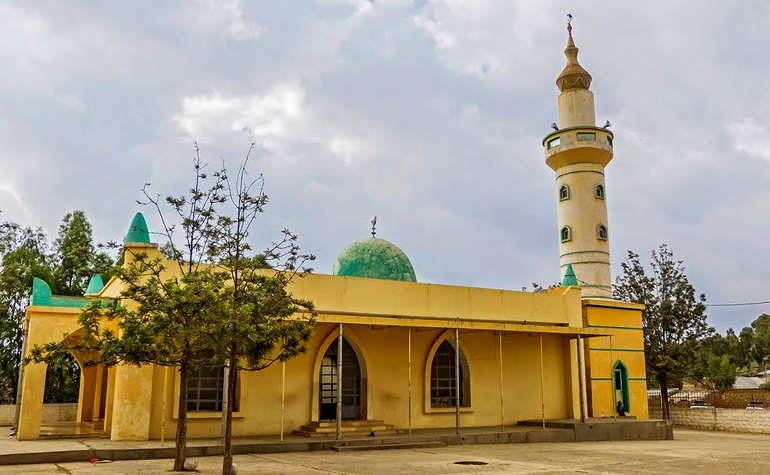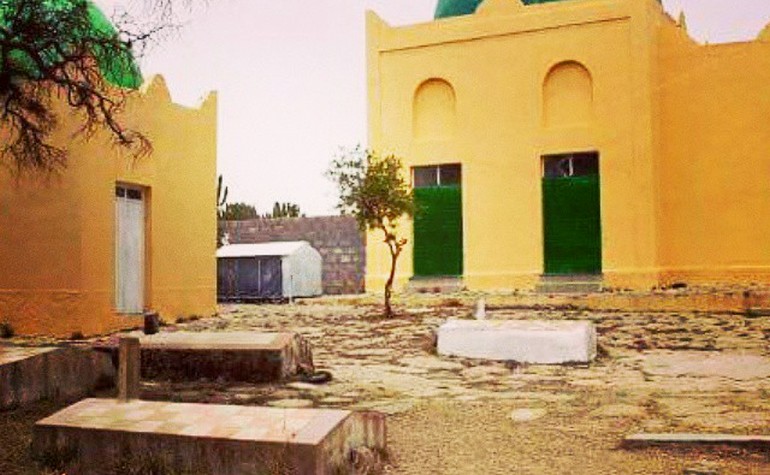
The Negashi Mosque – Photo: hedgait.blogspot.co.uk
This masjid (mosque) is located in the town of Negash in northern Ethiopia and is around the area where a just ruler, Ashama ibn Abjar (King Negus) lived at the time of the Prophet (peace and blessings of Allah be on him). He gave refuge to two groups of Sahabah, companions of the Prophet (peace and blessings of Allah be on him) who migrated there on account of the persecution of the Quraysh in the early days of Islam.
- After much suffering at the hands of the Quraysh in Makkah, the Prophet (peace and blessings of Allah be on him) commanded a small group of Muslims to make Hijrah (migration) to a safe place in the country of Abyssinia. (what is now Ethiopia). Abyssinia at that time was ruled by a Christian King (who later on embraced Islam), famous for his mercy and equity, whose title was Negus. They were sure to receive protection and worship and live in peace there.
- In Rajab of the fifth year of the Mission (614-615 CE), the first group emigrated to Abyssinia. The group comprised about twelve men and five women and included Uthman (may Allah be pleased with him) and his wife Ruqayyah (may Allah be pleased with her), the daughter of the Prophet (peace and blessings of Allah be on him). The Quraysh pursued them to the port of Shuaibah by the Red Sea to capture them, but their vessels had left the shore. When the group reached Abyssinia, they heard the rumour that the whole tribe of the Quraysh had accepted Islam. They were naturally very much pleased at the news and returned to their country. On approaching Makkah, they learnt that the rumour was false and the persecutions were going on unabated. Some of them decided to return to Abyssinia and the rest entered Makkah, seeking the protection of a few influential people. This is known as the first migration to Abyssinia.
- Later on, a bigger group of around 83 men and 18 women emigrated to Abyssinia led by Jafar bin Abu Talib (may Allah be pleased with him), the cousin of the Prophet (peace and blessings of Allah be on him). This is called the second emigration to that country and some Sahabah took part in both the migrations. The Qureysh did not like the emigrations, and the thought of peace enjoyed by the fugitives gave them no rest. They sent a delegation to Abyssinia led by Amr bin Aas (a non Muslim at the time) with handsome presents for the king, his courtiers and the clergy. The delegation first met the chiefs and the priests and, by offering them presents, succeeded in winning the court officials to their side.
- When the king gave audience to the Quraysh, Amr bin Aas said that the Muslims in Abyssinia were not refugees from persecution but were fugitives from justice and law, and requested the king to extradite them to Makkah. The king, however, wanted to hear the other side of the story also before giving any judgment, and summoned Jafar (may Allah be pleased with him) to the court to answer the charges against the Muslims. Jafar (may Allah be pleased with him) made a memorable defence, addressing the Christian king he said,“O King! We were ignorant people and we lived like wild animals. The strong among us lived by preying upon the weak. We obeyed no law and we acknowledged no authority save that of brute force. We worshipped idols made of stone or wood, and we knew nothing of human dignity. And then God, in His Mercy, sent to us His Messenger who was himself one of us. We knew about his truthfulness and his integrity. His character was exemplary, and he was the most well-born of the Arabs. He invited us toward the worship of One God, and he forbade us to worship idols. He exhorted us to tell the truth, and to protect the weak, the poor, the humble, the widows and the orphans. He ordered us to show respect to women, and never to slander them. We obeyed him and followed his teachings. Most of the people in our country are still polytheists, and they resented our conversion to the new faith which is called Islam. They began to persecute us and it was in order to escape from persecution by them that we sought and found sanctuary in your kingdom.”
- When Jafar (may Allah be pleased with him) concluded his speech, the king asked him, “Let us hear something of the Qur’an that your Prophet (peace and blessings of Allah be on him) has taught you.“ Jafar (may Allah be pleased with him) recited a few verses from the beginning of Surah ‘Maryam’, which touched the hearts of the king and the priestly class so much that tears flowed down their cheeks and wetted their beards. The king remarked, “By Allah, these words and the words revealed to Musa (upon him be peace) are the rays of one and the same light,” and he told the Quraysh embassy that he would by no means hand over the refugees to them. Then, disappointed and disgraced, they held a counsel. One of them said, “I have hit upon a plan that is sure to draw the king’s wrath upon their heads.“ Although the others did not agree to such a drastic step (for after all they were their own flesh and blood) he would not listen.
- The next day, they excited the king by telling him that those heretics denounced Isa (upon him be peace) [Jesus] and did not believe in his Divinity. The Muslims were again summoned to the court. They were much more distressed this time. When the king inquired about their belief in Isa (upon him be peace), they said: “We believe in what Allah has revealed about him to our Prophet (peace and blessings of Allah be on him), i.e. he is a servant and Prophet of Allah, and is His word, which He conveyed to the virgin and pure Maryam.“ Negus said: “Isa (upon him be peace) himself does not say anything beyond that.“ The priests then began to murmur in protest, but the king would not listen to them. He returned to the delegation the presents they had brought for him, and said to the Muslims, “Go and live in peace. If anybody ill-treats you, he will have to pay heavily for it.“ A royal declaration was also issued to that effect. This enhanced the prestige of the Muslims in the country, and the Quraysh delegation had to return crestfallen.
- King Negus is buried within the masjid compound as are several Sahabah who died there. Negash is, therefore, not only the burial place of the world’s first Muslim king but also the resting place of the bodies of the early Muslims of the world who were denied a home to be buried in because of their beliefs.
- The Muslims finally returned from Abyssinia in 7 A.H. but to Madinah and not Makkah.

The graveyard in the Negashi mosque compound – Photo: diary_of_an_imam (Instagram)
References: Fazail-e-Aamal – Sheik Zakariyya Kandhalvi, Wikipedia, Tigray.net


No comments:
Post a Comment